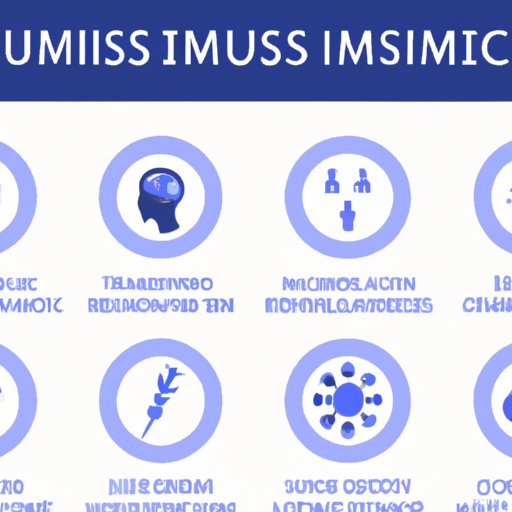
I. Introduction
Autoimmune diseases are a group of conditions where the immune system attacks healthy cells, mistaking them for foreign invaders. These diseases can affect any part of the body, from the brain to the skin, and can cause a range of symptoms that can make life difficult. Understanding autoimmune diseases is important for anyone, as these diseases are becoming more common across the world.
In this article, we’ll delve into the basics of autoimmune diseases, including what causes them, how to diagnose them, and what you can do to manage them. Whether you’re just learning about autoimmune diseases for the first time, or you’re looking for more information on the latest treatments, this article should cover all your bases.
II. A Beginner’s Guide to Understanding Autoimmune Diseases
To understand autoimmune diseases, it’s important to first understand the immune system. Our immune system is a complex network of cells, tissues, and organs that work together to protect the body from foreign invaders such as bacteria and viruses. When the immune system detects a foreign invader, it creates antibodies that destroy the invader and prevent it from harming the body.
However, in autoimmune diseases, the immune system mistakenly attacks healthy cells because it can’t tell the difference between healthy cells and harmful invaders. This creates inflammation and damage to the body, which can lead to symptoms such as fatigue, pain, and swelling.
There are over 80 different autoimmune diseases, and they can affect different parts of the body. Some of the most common autoimmune diseases include rheumatoid arthritis, lupus, and celiac disease.
III. The Science Behind Autoimmune Diseases: Causes and Symptoms
The exact cause of autoimmune diseases is unknown, but researchers believe that both environmental and genetic factors play a role in triggering the immune system to attack healthy cells. Some common environmental triggers include infections, medications, and exposure to chemicals or pollution.
Each autoimmune disease has its own set of symptoms, but some of the most common symptoms include fatigue, joint pain, and inflammation. Other symptoms may include dry eyes, skin rashes, or digestive problems.
Diagnosing autoimmune diseases can be difficult, as symptoms can be similar to other health conditions. Your doctor may use a range of diagnostic tests, including blood tests, imaging tests, or biopsies, to identify autoimmune diseases.
IV. Living with an Autoimmune Disease: Coping Strategies and Treatment Options
Living with an autoimmune disease can be challenging, but there are many strategies you can use to help manage your symptoms and improve your quality of life. Coping strategies may include things like getting enough rest, eating a healthy diet, and reducing stress.
Treatment for autoimmune diseases will depend on the type of disease and the severity of symptoms. Common treatments include medications that reduce inflammation, such as nonsteroidal anti-inflammatory drugs (NSAIDs) or corticosteroids. Lifestyle changes, such as exercising regularly and avoiding triggers, can also help manage symptoms.
In addition to traditional treatments, some people with autoimmune diseases may also benefit from complementary therapies, such as acupuncture, massage, or yoga. These therapies can help reduce stress and improve overall well-being.
V. Autoimmune Diseases: An Overview of Common Medical Conditions
There are many different autoimmune diseases, but some of the most common include rheumatoid arthritis, lupus, and celiac disease.
Rheumatoid arthritis is a chronic inflammatory disease that affects the joints. It can cause joint pain, stiffness, and swelling, and can lead to joint damage if left untreated. Treatment for rheumatoid arthritis may include medications, such as disease-modifying anti-rheumatic drugs (DMARDs), or lifestyle changes, such as exercise or weight loss.
Lupus is a chronic autoimmune disease that can affect many parts of the body, including the skin, joints, and internal organs. Symptoms of lupus can vary widely, but may include fatigue, joint pain, or skin rashes. Treatment for lupus may include medications, such as corticosteroids or immunosuppressive drugs, or lifestyle changes, such as getting enough rest and reducing stress.
Celiac disease is an autoimmune disease that affects the digestive system. People with celiac disease have an immune reaction to gluten, a protein found in wheat, barley, and rye. This reaction can damage the small intestine and lead to symptoms such as digestive problems, fatigue, and skin rashes. Treatment for celiac disease involves avoiding gluten-containing foods.
VI. Breaking the Stigma: Raising Awareness about Autoimmune Diseases
Despite the growing prevalence of autoimmune diseases, they remain misunderstood and stigmatized. Many people with these conditions struggle to get an accurate diagnosis, or feel that their symptoms are not taken seriously by others.
There are many ways to raise awareness about autoimmune diseases and combat stigma. For example, you can share your story with others, participate in community events or fundraisers, or advocate for better healthcare policies for people with autoimmune diseases.
It’s also important to remember that there are many resources available for people with autoimmune diseases and their loved ones. Support groups, online forums, and educational resources can all provide valuable information and emotional support.
VII. Conclusion
Autoimmune diseases are complex and often misunderstood conditions that can affect anyone. Understanding the basics of autoimmune diseases, including their causes, symptoms, and treatments, is an important step towards managing these conditions and improving your quality of life.
If you think you may have an autoimmune disease, it’s important to seek out medical care and support. By taking an active role in managing your health, you can help reduce the impact of autoimmune diseases on your life and find a path towards wellness.




